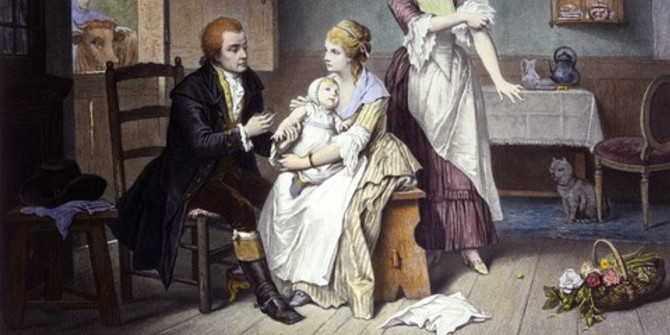
 A COVID-19 vaccine appears to be the only way out of repeated lockdowns – yet in the UK and US, where trust in governments’ handling of the pandemic is already low, many people are minded to refuse it. Rebecca Forman and Lucy Thompson (LSE) set out what a proactive vaccination campaign would look like.
A COVID-19 vaccine appears to be the only way out of repeated lockdowns – yet in the UK and US, where trust in governments’ handling of the pandemic is already low, many people are minded to refuse it. Rebecca Forman and Lucy Thompson (LSE) set out what a proactive vaccination campaign would look like.
Since the virus emerged onto the global scene in January, the world has been watching the race for a vaccine as seemingly the only hope of ending the lockdowns around the world. It is arguably the first time there has been such focus on vaccine development. Over 170 vaccine candidates are now in development, with 15 already in human trials.
There are many challenges in the development of a vaccine for any disease. Scientific research and testing is arguably the greatest of these hurdles in the “standard” development of a vaccine – which is staged and serial in nature. But with huge geographical areas of the world in lockdown, global economics in crisis, and the threat of a second wave before the end of the year, immunologists are under pressure to do everything as quickly as possible and in parallel. Given the unprecedented urgency for this vaccine, logistics and funding have been highlighted by immunologists as their greatest challenges.

In August, Russia claimed to have produced the world’s first vaccine – Sputnik V. There are growing concerns among the international scientific community that it has not passed adequate testing protocols before being rolled out. But the problems with Vladimir Putin’s move, according to Professor Francois Balloux of the UCL Genetics Institute, are even farther reaching. As he told the Telegraph: “Any problem with the Russian vaccination campaign would be disastrous both through its negative effects on health, but also because it would further set back the acceptance of vaccines in the population.”
Populations around the world face a strange contradiction: most think a vaccine is their ticket back to normality, but simultaneously many of the same people do not feel safe getting a vaccine themselves. Despite the disruption the US currently faces as a result of the virus, recent polls indicate that less than 50 percent of its residents would willingly receive a COVID-19 vaccine at present. Research by Ipsos MORI and King’s College London suggests a similar number in the UK; 53% say they would definitely get vaccinated, while 1 in 6 Britons (16%) say they are unlikely to or definitely won’t get a vaccine if one becomes available. This will probably not be enough. Herd immunity is a powerful public health tool; only by ensuring enough people are vaccinated can we prevent the illness and suffering that comes from its spread. The minimum vaccination coverage needed to get a handle on the novel Coronavirus is estimated at between 52 – 85% to achieve satisfactory herd immunity levels.
Why is this the case? Perhaps one reason for the profusion of the true and false information about COVID-19 is, as described by the World Health Organization, the “infodemic” that has accompanied the pandemic. This flood of misinformation is due to public fear, worry and isolation during lockdown, which led people to seek information on social media platforms. There is also still so much we do not know about COVID-19 as a novel infectious disease. “Disinformation campaigns” abound, deflecting blame and pushing false narratives around the global COVID-19 response.
Examples include a fake news video called “Plandemic”, which claimed that the new coronavirus was hype and that a vaccine would kill millions. This received more than eight million views on YouTube before it was taken down. Demonstrators from Germany, the UK, France and the US (among others) have been spreading bizarre fantasies that Bill Gates, one of the world’s great philanthropists, conspired with “Big Pharma” to engineer SARS-CoV-2 so he could establish a global health dictatorship.
What can be done? As we have previously written for the LSE COVID-19 blog, the UK government’s claim that it is “following the science” has lacked transparency, and has potentially damaged public faith in government. By contrast, Jacinda Ardern’s coronavirus response has been lauded as a “masterclass in crisis leadership”. The direction-giving, meaning-making and empathy she has communicated has been critical to New Zealand’s success in the crisis so far. Recent polls indicate an awe-inspiring 80% confidence in the New Zealand government at present, compared to 44% in the UK.
Clear, transparent communication policies will play an equally crucial role in the COVID-19 vaccination strategy. We need proactive, educational COVID-19 vaccine campaigns, in which trusted public health authorities use traditional and social media to engage as diverse an audience as possible. As we have seen, social media is a conduit for both factual and false information: it is critical that “fake news” is contested in real time before it is normalised for further swathes of the population. Educational campaigns for the public should also run alongside campaigns for front-line health workers internationally, as these groups will also play a key role in encouraging and reassuring populations to get vaccinated. This campaign should also involve engaging influencers, because if the general public see that political leaders and celebrities are accepting vaccinations, they may be encouraged to follow suit.
This groundwork must begin now – and must be a worldwide effort. Only by ensuring significant and equitable global uptake of a vaccine can we stop this virus. We cannot let poor scientific communication undermine the efforts made so far.
- This article appeared originally at the LSE’s COVID-19 blog.



